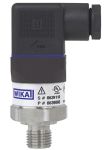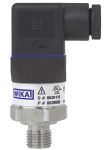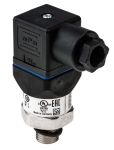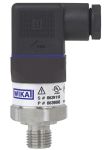Sensors & Transducers
Proximity sensors detect an object in close proximity without any physical contact. The sensor device uses sound, light, infrared (IR) or electromagnetic fields to help with the detection of an object within range.Proximity Sensors (excluding Magnetic Sensors) generally have a long life span due to its non-contact sensing abilities. Proximity sensors can be used in many diverse environments that require a detection device.Some key features and benefits of proximity sensors include:Motion detection of metallic and non-metallic objectsUsed in a wide range of temperatures, ranging from -50°C to 100° CelsiusHigh speed motion sensor with non contact propertiesCan be used in locations and applications with an oil or water levelQuicker response times than a contactorTypes of Proximity SensorThere are multiple types of sensors available, ranging from Ultrasonic Sensors, Infrared Sensors (IR Sensors), to Inductive Proximity Sensors which all use different components, measurements and temperatures. Each have specific applications, so choosing the right one for the job is important.Infrared Sensors (IR Sensor)Infrared Sensors or IR sensors are very common and consist of Passive Infrared Sensors (PIR) and Active Infrared Sensors. Both types of device use infrared (IR), however, a PIR sensor has a pair of pyroelectric infrared sensors in a magnetic lens which engage when the signal between them changes.An active IR sensor uses an IR LED that emits an infrared beam towards an infrared receiver. The receiver will detect obstacles that block the infrared radiation.Inductive Proximity SensorsAn inductive proximity sensor uses an oscillating circuit which generates an electromagnetic field. A change in oscillation occurs when the device detects any type of ferrous metal within the inductive proximity. This includes aluminium, copper, brass, and iron.Capacitive Proximity SensorsCapacitive Sensors are similar to Inductive Sensors but they can detect nearly all other shapes and materials, even through non-metallic walls. They are designed for use with non-ferrous materials and are ideal for close-range applications such as level detection and monitoringUltrasonic Proximity SensorsUltrasonic Sensors emit and receive a high frequency sound wave which can be reflected or absorbed by anything within its sensing range. Ultrasonic sensors are generally high speed and can be used over long distances for the measurement of wind speed, fluid level, and speed through air or water.Magnetic Proximity SensorsMagnetic proximity sensors are designed to measure the presence or absence of an object by using an external magnetic field.You can learn more in our complete guide to proximity sensors.
-
WIKA A-10 Pressure Sensor for Gas, Liquid, 10bar Max Pressure Reading, Analogue
VND5,320,509.67 -
WIKA A-10 Pressure Sensor for Gas, Liquid, 16bar Max Pressure Reading, Analogue
VND4,695,121.20 -
WIKA A-10 Pressure Sensor for Gas, Liquid, 6bar Max Pressure Reading, Analogue
VND4,695,121.20 -
WIKA A-10 Relative Pressure Sensor for Hydraulic Fluid, 40bar Max Pressure Reading, Current
VND4,804,548.49 -
WIKA S-11 Pressure Sensor for Various Media, 25bar Max Pressure Reading, Current
VND17,025,254.33 -
WIKA S-20 Pressure Sensor for Gas, Liquid, 10bar Max Pressure Reading, Analogue
VND10,607,333.31 -
WIKA S-20 Pressure Sensor for Gas, Liquid, 6bar Max Pressure Reading, Analogue
VND10,609,216.38









